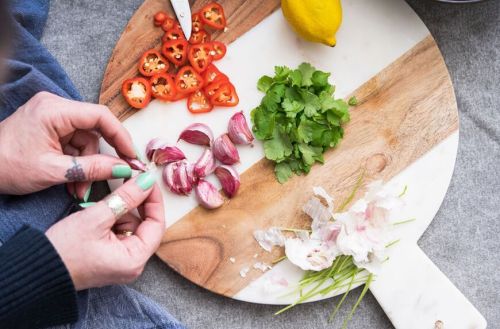Americans don’t know how to wash their hands—and it’s making us all sick
What causes food poisoning bacteria? Well, a USDA study showed that Americans failed to wash their hands 97 percent of the time that they should have when cooking, leading to contamination. By not properly handwashing, turkey burgers, many folks are contaminating spice jars, refrigerator door handles, salad, and more.

Foodborne illnesses seem to be running rampant: Salad lovers have had to check their romaine lettuce consumption as a result of a widespread E. coli outbreak among pre-packaged greens, and fruit fanatics have had to beware of salmonella in pre-cut melon. Heck, even breakfast cereal isn’t safe. Well, recent findings from the US Department of Agriculture (USDA) found that people’s poor handwashing habits during meal prep is likely a major reason why approximately 48 million people contract a noshing-related illness each year.
For the USDA study, researchers enlisted 383 volunteers and showed a kitchen-safety video on how to properly use food thermometers to 182 of them. They then asked all participants to prepare turkey burgers (the scientists spiked the raw meat with a harmless pathogen) and salad and filmed them in action. While those who watched the video were twice as likely to at least attempt using the thermometer, scientists observed that few used the tool properly (if at all) and also failed to wash their hands for about 97 percent of the more than 1,000 times they should have done so. This means that after they came in contact with the raw meat, they moved around the kitchen grabbings spices, touching the refrigerator door handle, and (eeek!) preparing the salad greens, thus spreading the raw turkey goo everywhere.
Study participants failed to wash their hands for about 97 percent of the more than 1,000 times they should have done so.
After testing the kitchen surfaces for the pathogen, scientists found that the participants contaminated the spice containers 48 percent of the time, refrigerator doors 11 percent of the time, and salad 5 percent of the time. And here’s how those numbers become even scarier: By extrapolating the data from the test, the USDA experts found that if every American household decided to make the same meal of turkey burgers and salad, about 57 million would leave bacteria on spice shakers; close to 12 million would have bacteria on fridge door handles; and about 6 million households would transfer bacteria from the raw meat to the salads, according to NBC News. Yikes.
Additionally, once contamination occurs in a kitchen, the bacteria survives for a while, thus increasing the chance of spreading it further. “Now that pathogen is living on that surface for the next day and a half, and so anyone who goes to get salt or pepper to put on their food is going to touch it,” Carmen Rottenberg, top food safety official at the USDA, says.
To keep your kitchen and food safe, wash your hands with soap and water immediately after you handle raw meat, poultry, or eggs—before you touch anything else—for a solid 20 seconds (like, Grey’s Anatomy–style), and then dry your hands on a clean towel, per USDA guidelines. And don’t become complacent when you grill outside this summer—you need to be just as diligent about avoiding contamination in your backyard as you would in your kitchen. Food poisoning is such a BBQ buzzkill.
This one-minute hack for cleaning your sponge is a game-changer, and these are the kitchen-cleaning products W+G staff-members swear by.
Sign Up for Our Daily Newsletter
Get all the latest in wellness, trends, food, fitness, beauty, and more delivered right to your inbox.
Got it, you've been added to our email list.










